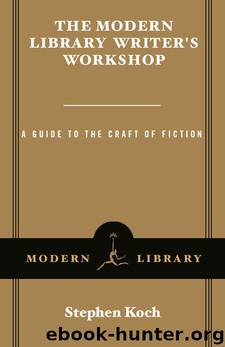The Modern Library Writer's Workshop: A Guide to the Craft of Fiction (Modern Library Paperbacks) by Stephen Koch

Author:Stephen Koch [Koch, Stephen]
Language: eng
Format: mobi
Publisher: Random House Publishing Group
Published: 2009-05-08T16:00:00+00:00
YOUR VOICE, AND MAKING IT SOUND GOOD
John Wray, whose fine debut novel, The Right Hand of Sleep, went on to fully deserved international critical acclaim, once told me that “the first thing I realized, way back when I first began to work on the book, was that if this thing had any hope of being good, I had to make it at least sound good. At least in my own ears, it had to do that much. Of course, sounding good wouldn't necessarily make the book be good, but maybe if it did sound good—really good—the sound might pull the story along with it and help carry the novel the whole distance. That helped me. That made it possible for me to work.”
This remark might strike you as a confession to superficiality. Absolutely not. It is a penetrating insight into how style works as a basic tool for invention. A voice can be exactly the lever you need to lift a story into existence, functioning in very much the same way that the story itself leverages a character into life. We've already noticed that the sound of a character's voice may cue you over what the character is going to say. It's not a long step from knowing what a character will say to knowing what that character will do. Likewise, knowing what a story will sound like is closer than you may think to what that story is going to be.
“Making things sound good” brings us to the tricky issue of influence. You are going to be influenced. Whether they know and admit it or not, all writers without exception work under the influence of other writers. Don't ask whether you are going to be influenced by other writers. Ask how. You learned to talk from other talkers, and the talk of others is still teaching you. It's where you got your fluency, your accent, your vocabulary, your slang—just about everything—and all these things are continually refreshed by—more talk. Well, in just the same way, other writers will teach you how to write, and they are going to keep on teaching you as long as you keep going.
I know, I know—this sounds frustrating. You aren't looking for other writers' voices. You're looking for your own. And you should be. But precisely because style is an exchange, the place to find your voice is among the voices of others and through the love of them.
Let me illustrate. Let's say you love the hard-boiled voice of Raymond Chandler's prose. You want to try something like it, and you don't quite know how. You have nothing but the voice. It may be all you need. A Chandlerlike voice is capable of telling only certain kinds of stories about certain kinds of people. Yet the people Chandler knew and wrote about—his era, his kind of California, even his kind of crime—all of these things have vanished from the face of the earth. You cannot retrieve them. But you do have that voice. Whatever it has, whatever it is, remains alive, alive in your love of it, inside you, somehow or other.
Download
This site does not store any files on its server. We only index and link to content provided by other sites. Please contact the content providers to delete copyright contents if any and email us, we'll remove relevant links or contents immediately.
| Anthologies | Short Stories |
The Tidewater Tales by John Barth(12643)
Kathy Andrews Collection by Kathy Andrews(11801)
Tell Tale: Stories by Jeffrey Archer(9026)
This Is How You Lose Her by Junot Diaz(6868)
The Mistress Wife by Lynne Graham(6475)
The Last Wish (The Witcher Book 1) by Andrzej Sapkowski(5449)
Dancing After Hours by Andre Dubus(5271)
The Sympathizer by Viet Thanh Nguyen(4382)
Be in a Treehouse by Pete Nelson(4029)
The Secret Wife by Lynne Graham(3905)
Maps In A Mirror by Orson Scott Card(3884)
Tangled by Emma Chase(3749)
Ficciones by Jorge Luis Borges(3622)
The House on Mango Street by Sandra Cisneros(3457)
A Knight of the Seven Kingdoms by George R R Martin(3309)
Girls Who Bite by Delilah Devlin(3249)
You Lost Him at Hello by Jess McCann(3060)
MatchUp by Lee Child(2874)
Once Upon a Wedding by Kait Nolan(2785)
